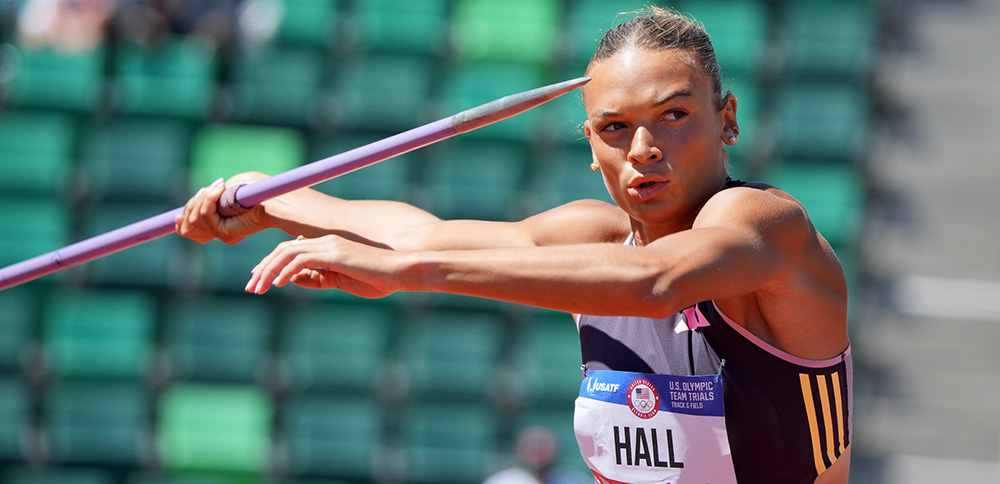
LUCK HASN’T ALWAYS been on Anna Hall’s side the last few years. Yes, she’s certainly had plenty of success — podium finishes in the last two WC heptathlons — but anytime she seems to be gaining momentum, injuries have popped up.
Still, Hall is nothing if not resilient. The 23-year-old Colorado native has found a way through everything fate has thrown at her. The latest example came at the Olympic Trials, where she rebounded from January surgery to not only make the team for Paris, but also dominate the competition.
It was a dramatic conclusion to a turbulent saga that began 3 years ago. Coming into the ’21 Trials, Hall was an up-and-coming star, expected to contend for a heptathlon slot on Team USA’s Tokyo roster. Disaster struck just seconds into the first event when she crashed out in the 100H and broke her foot.
“I didn’t really know what the future would hold or if I would have to switch events, she told T&FN several months later. “Just coming back from the foot thing has definitely been a very big struggle.”
Hall transferred from Georgia to Florida after that season and excelled in ’22 with NCAA and U.S. titles, then came away with a breakthrough score of 6755 to earn the bronze at the World Championships in Eugene.
She turned pro after that and headed into ’23 as a favorite to move up the podium. Picking up where she’d left off, Hall won the USATF Indoor title in the pentathlon with an American Record 5004 that moved her to No. 4 on the all-time world list. She also won the individual 400 at that meet, demonstrating her impressive speed.
At Götzis, Austria — the premiere international combined-events invitational — she raised her heptathlon PR to 6988, making her the fifth-best of all-time, and No. 2 behind legendary Jackie Joyner-Kersee among Americans. She defended her U.S. title with ease, but a freak injury while training for the long jump caused her to hyperextend her knee, nearly knocking her out of the World Championships in Budapest. Once again she rallied, scoring 6720 and taking silver.
“We did everything we could through all the treatments and rehabs, and I thought I was ready to go and by no means can I expect anything less than gold for myself,” she said after a gutsy 2:04.09 in the concluding 800 left her just 20 points behind Great Britain’s Katarina Johnson-Thompson. “You just can’t predict how the body is going to respond and I just fought the best that I could.”
Coming out of Budapest, a narrative seemed to have been set: Bronze in ’22, silver in ’23, surely gold was on tap for ’24.
Alas, after a strong training block in the fall, Hall started the Olympic year needing knee surgery for a new issue. It was just 5 months before the Olympic Trials, leaving her with a seemingly impossible deadline for recovery. “I remember having surgery, I was just like so like deeply sad because I had such a good fall and I felt so ready,” she says. “And then it was all just kinda gone like that.”
Yet again, Hall pushed through, returning to competition in April, roughly 13 weeks post-surgery. The results this spring were, by her own admission, discouraging. She came into Eugene with season’s bests of just 13.57 in the hurdles, well below her 12.75 PR, and 5-8 ¾ (1.75) in the high jump, down from the 6-3½ (1.92) she’d cleared last year.
Arriving in Eugene, she focused on rehabilitating her confidence nearly as much as her battered body.
“Honestly like a week ago I wasn’t there mentally,” she admits. “Like I wasn’t ready for this meet, and then one day I was just like, ‘No, like we’re gonna make this happen.’”
She noticed improvements at practice immediately. “I will fight for every hundredth, inch, point,” she wrote in her training journal (which she posted on social media following the event). “I am the nastiest competitor here, f—king act like it.”
And indeed she did, with yearly bests in five of the seven events (six if you count her season debut in the 800) and a winning score of 6614. While well down from her PR, it’s still a score that only six American women (including herself) have ever surpassed.
“These past few days I really just tapped into my self-belief and trying to tell myself I’ve been here before, like I can do this,” she says.
Now Hall is heading to Paris, where she hopes to be the first American to win the Olympic gold since Joyner Kersee took back-to-back titles in ’88 and ’92.
“The biggest thing was my coaches all year have been telling me you’re gonna be able to peak in Paris,” she says. “We just have to get there. I’ve had to earn these next 6 weeks and we can get a lot done. And I think we saw a lot of progress and even room for growth here. I’m really excited to be able to have the time to work for that.”